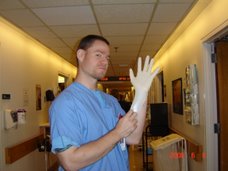Reasons of Nursing Shortage
To solve the problem of nursing shortage,the first thing is to find out what cause nursing shortage.
Saturday, June 30, 2007
Tuesday, June 19, 2007
nursing

http://www.rcna.org.au/content/nursing_shortage.pdf
The nursing shortage: Part way down the slippery slopeCollegian Vol 10 No 3 2003 31IntroductionThere has been considerable debate published on various aspectsof the global nursing shortage aimed at enlightening readers oncauses, effects and possible strategies for improvement. However,the crisis of nursing retention continues to grow at a nationaland international level. The following discussion revisits a few ofthe issues in an attempt to provide an original and somewhatprovocative perspective.
These issues include the differences between recruitment and retention, generational, geographicand specialty issues, the finite pool of nurses and the educationof nurses. The overall aim of the following discussion is to highlightthe centrality of nurses’ working conditions in all debatesurrounding nursing shortages.Recruitment versus retentionIt is suggested here that the nursing shortage consists of two parts– those shortages caused by recruitment difficulties and thoseshortages caused by retention issues (Buchan 2002) and thatrecruitment is a different proposition to retention.
nursing

http://content.healthaffairs.org/cgi/content/abstract/22/6/199
The Future Of The Nurse Shortage: Will Wage Increases Close The Gap? Joanne Spetz and Ruth Given
In recent years the U.S. media have been reporting a shortage of registered nurses (RNs). In theory, labor-market shortages are self-correcting; wage increases will bring labor markets into equilibrium, and policy intervention is not necessary. In this paper we develop a simple forecasting model and ask the question: How high must RN wages rise in the future to end the RN shortage? We find that inflation-adjusted wages must increase 3.2–3.8 percent per year between 2002 and 2016, with wages cumulatively rising up to 69 percent, to end the shortage. Total RN expenditures would more than double by 2016.
The Future Of The Nurse Shortage: Will Wage Increases Close The Gap? Joanne Spetz and Ruth Given
In recent years the U.S. media have been reporting a shortage of registered nurses (RNs). In theory, labor-market shortages are self-correcting; wage increases will bring labor markets into equilibrium, and policy intervention is not necessary. In this paper we develop a simple forecasting model and ask the question: How high must RN wages rise in the future to end the RN shortage? We find that inflation-adjusted wages must increase 3.2–3.8 percent per year between 2002 and 2016, with wages cumulatively rising up to 69 percent, to end the shortage. Total RN expenditures would more than double by 2016.
nursing

http://www.nursingworld.org/ojin/topic14/tpc14_3.htm
A CONTINUING CHALLENGE: The Shortage of Educationally Prepared Nursing Faculty
Ada Sue Hinshaw, PhD, RN, FAAN
Abstract
The profession is facing a unique shortage of nursing faculty. Schools of Nursing have always had a shortage of doctorally prepared nursing faculty. The academic norm for faculty teaching in baccalaureate and graduate programs to hold earned doctoral degrees was established later in nursing than for other disciplines. At best, 50% of nursing faculty in such programs have met this academic standard. In addition, the shortage is predicted to escalate in the next decade due to the retirement of a "graying professoriate" of nursing faculty.
The shortage of nursing faculty is interwoven with the current national shortage of nurses. The shortage of nurses requires the educational programs of the profession to supply more graduates. But the shortage of nursing faculty will limit student enrollments and likely decrease the number of graduates. Conversely, the shortage of nurses will offer many opportunities and choices to nurses and may decrease the number selecting graduate studies and an academic career, thus contributing to the shortage of nursing faculty
The shortage of nursing faculty will also have consequences for the generation of the knowledge base for nursing practice. With a decreased number of individuals to conduct research and the loss of senior investigators through retirement, continuing development of nursing's knowledge base may be curtailed. The shortage of nursing faculty will also limit the professional leaders who are able to shape health policy in the state, national, and international arenas.
This article outlines a number of factors influencing the shortage of nursing faculty. Several institutional School of Nursing strategies are suggested for countering the shortage situation. In addition, several national professional and policy strategies are suggested. More creative strategies need to be developed and evaluated by Schools of Nursing and by the profession.
A CONTINUING CHALLENGE: The Shortage of Educationally Prepared Nursing Faculty
Ada Sue Hinshaw, PhD, RN, FAAN
Abstract
The profession is facing a unique shortage of nursing faculty. Schools of Nursing have always had a shortage of doctorally prepared nursing faculty. The academic norm for faculty teaching in baccalaureate and graduate programs to hold earned doctoral degrees was established later in nursing than for other disciplines. At best, 50% of nursing faculty in such programs have met this academic standard. In addition, the shortage is predicted to escalate in the next decade due to the retirement of a "graying professoriate" of nursing faculty.
The shortage of nursing faculty is interwoven with the current national shortage of nurses. The shortage of nurses requires the educational programs of the profession to supply more graduates. But the shortage of nursing faculty will limit student enrollments and likely decrease the number of graduates. Conversely, the shortage of nurses will offer many opportunities and choices to nurses and may decrease the number selecting graduate studies and an academic career, thus contributing to the shortage of nursing faculty
The shortage of nursing faculty will also have consequences for the generation of the knowledge base for nursing practice. With a decreased number of individuals to conduct research and the loss of senior investigators through retirement, continuing development of nursing's knowledge base may be curtailed. The shortage of nursing faculty will also limit the professional leaders who are able to shape health policy in the state, national, and international arenas.
This article outlines a number of factors influencing the shortage of nursing faculty. Several institutional School of Nursing strategies are suggested for countering the shortage situation. In addition, several national professional and policy strategies are suggested. More creative strategies need to be developed and evaluated by Schools of Nursing and by the profession.
nursing

http://www.nursingworld.org/ojin/topic14/tpc14_3.htm
The profession is facing a unique shortage of nursing faculty. Schools of Nursing have always had a shortage of doctorally prepared nursing faculty. The academic norm for faculty teaching in baccalaureate and graduate programs to hold earned doctoral degrees was established later in nursing than for other disciplines. At best, 50% of nursing faculty in such programs have met this academic standard. In addition, the shortage is predicted to escalate in the next decade due to the retirement of a "graying professoriate" of nursing faculty.
The shortage of nursing faculty is interwoven with the current national shortage of nurses. The shortage of nurses requires the educational programs of the profession to supply more graduates. But the shortage of nursing faculty will limit student enrollments and likely decrease the number of graduates. Conversely, the shortage of nurses will offer many opportunities and choices to nurses and may decrease the number selecting graduate studies and an academic career, thus contributing to the shortage of nursing faculty
The shortage of nursing faculty will also have consequences for the generation of the knowledge base for nursing practice. With a decreased number of individuals to conduct research and the loss of senior investigators through retirement, continuing development of nursing's knowledge base may be curtailed. The shortage of nursing faculty will also limit the professional leaders who are able to shape health policy in the state, national, and international arenas.
This article outlines a number of factors influencing the shortage of nursing faculty. Several institutional School of Nursing strategies are suggested for countering the shortage situation. In addition, several national professional and policy strategies are suggested. More creative strategies need to be developed and evaluated by Schools of Nursing and by the profession.
Key words: shortage of nursing faculty, nursing faculty shortage, strategies for shortage of faculty, consequences of nursing faculty shortage
Introduction
The profession is facing a unique shortage of nursing faculty. Schools of Nursing have always had a shortage of doctorally prepared nursing faculty. The academic norm for faculty teaching in baccalaureate and graduate programs to hold earned doctoral degrees was established later in nursing than for other disciplines. At best, 50% of nursing faculty in such programs have met this academic standard. In addition, the shortage is predicted to escalate in the next decade due to the retirement of a "graying professoriate" of nursing faculty.
The shortage of nursing faculty is interwoven with the current national shortage of nurses. The shortage of nurses requires the educational programs of the profession to supply more graduates. But the shortage of nursing faculty will limit student enrollments and likely decrease the number of graduates. Conversely, the shortage of nurses will offer many opportunities and choices to nurses and may decrease the number selecting graduate studies and an academic career, thus contributing to the shortage of nursing faculty
The shortage of nursing faculty will also have consequences for the generation of the knowledge base for nursing practice. With a decreased number of individuals to conduct research and the loss of senior investigators through retirement, continuing development of nursing's knowledge base may be curtailed. The shortage of nursing faculty will also limit the professional leaders who are able to shape health policy in the state, national, and international arenas.
This article outlines a number of factors influencing the shortage of nursing faculty. Several institutional School of Nursing strategies are suggested for countering the shortage situation. In addition, several national professional and policy strategies are suggested. More creative strategies need to be developed and evaluated by Schools of Nursing and by the profession.
Key words: shortage of nursing faculty, nursing faculty shortage, strategies for shortage of faculty, consequences of nursing faculty shortage
Introduction
nursing

http://www.jonajournal.com/pt/re/jona/abstract.00005110-200202000-00005.htm;jsessionid=G33h0R241yhbRn8zGyQJCllbQ5kkNqBx64KyknPhnPjGSMYJrPyL!1240718814!-949856144!8091!-1
According to healthcare experts, the present nursing shortage is going to extend to 2020 with an estimated 400,000 RN vacancies. A number of factors are contributing to the shortage: an increase in the age of registered nurses, decreased school enrollment, increased career opportunities for women, changes in the healthcare delivery system, nurse "burn-out," and the public's misunderstanding of what nurses do. Additionally, a number of social and economic trends are going to affect the healthcare delivery system in the future, such as: aging of the population, increased technology, the increase of the health/wellness movement, changes in employee's work ethic, influence of Generation X and dot.com workers, and scarcity of entry-level and low-wage workers. If nursing is going to be a major player in the healthcare delivery system in 2020, nurses must take an active role in developing and implementing a strategic plan. We need to look beyond solutions used in the past, such as increasing compensation and modifying school curriculums.
According to healthcare experts, the present nursing shortage is going to extend to 2020 with an estimated 400,000 RN vacancies. A number of factors are contributing to the shortage: an increase in the age of registered nurses, decreased school enrollment, increased career opportunities for women, changes in the healthcare delivery system, nurse "burn-out," and the public's misunderstanding of what nurses do. Additionally, a number of social and economic trends are going to affect the healthcare delivery system in the future, such as: aging of the population, increased technology, the increase of the health/wellness movement, changes in employee's work ethic, influence of Generation X and dot.com workers, and scarcity of entry-level and low-wage workers. If nursing is going to be a major player in the healthcare delivery system in 2020, nurses must take an active role in developing and implementing a strategic plan. We need to look beyond solutions used in the past, such as increasing compensation and modifying school curriculums.
Subscribe to:
Comments (Atom)




